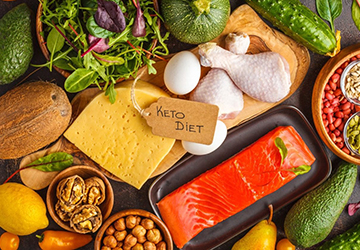Are you thinking of starting with a ketogenic diet? Emerging as one of the most popular diets recently due to the incredible results it has had on both weight loss and bettering health, the keto diet is also one of the most misunderstood diets.
Many people start exercising without a clear plan or need more knowledge, leading them to encounter common pitfalls quickly.

In this blog, we will discuss those mistakes and the practical solutions that would clear up the fog for you so that you are set on the right foot for success.
A ketogenic diet contains high fats, moderate proteins, and low carbohydrates. The main idea is to force your body into a metabolic state called ketosis, which burns fats for energy rather than burning carbohydrates.
It is a fundamental understanding, as achieving and maintaining ketosis form the very bedrock of a fruitful outing with keto. Fail to do so, and you're left with yet another low-carb plan, not receiving the unique benefits offered by keto.
Entering the world of the keto diet could be simultaneously adventurous and daunting. To make that path relatively straightforward, one must avoid four common mistakes.
Most people make one common mistake when they start the keto diet: they need to pay more attention to the amount of carbohydrates they consume because most don't reduce the carbohydrates to a level that is enough to put the body into ketosis.
To truly enter ketosis, you must measure every gram of carbohydrates you consume. Ideally, you are supposed to consume between 20 and 50g of carbohydrates daily. You can track this through a food tracking app, which will keep you in check so you do not exceed this limit.
What's most pertinent about this fact is ketosis; this is the core mechanism within keto that must be maintained. Without enough of a decrease in carbs, your body will continue using glucose to power you up rather than shifting over to fat, which would rob you of the benefit.
Most people new to the keto diet usually emphasize the macronutrient ratios of fat, proteins, and carbs more than the nutritional quality of food.
Make nutrient-dense foods such as fats and proteins from whole, unprocessed sources a staple. Avoid poor-quality processed foods packed with unhealthy fats and additives that can throw you off your health-related goals.
Essential, high-quality nutrients that the body needs include overall health. It may also help with some common early side effects of the keto diet, termed "keto flu." The macronutrients give energy and promote life, while micronutrients aid in bodily functions and help prevent deficiencies.
This diet is high in protein. However, overconsuming protein can trigger gluconeogenesis, transforming excess protein into glucose and potentially disrupting ketosis.
Optimize your protein consumption. Aim for approximately 0.6-1.0 grams of protein per pound of lean body mass, adjusting based on your fitness goals and activity levels.
Appropriate protein intake is vital for sustaining ketosis. Balancing your protein consumption guarantees that your body primarily burns fat for fuel, maximizing the efficacy of the keto diet.
When starting a keto diet, many must remember the importance of proper hydration and electrolyte balance. This oversight can lead to dehydration and an imbalance in the body's electrolytes, which can cause the diuretic effect of a low-carb diet.

Be sure to increase your water intake while on a keto diet. Additionally, it's essential to supplement with critical electrolytes like sodium, potassium, and magnesium to maintain healthy levels as your body adjusts to the keto way of low carbohydrate intake.
Proper hydration and maintaining correct electrolyte levels are crucial, especially in the initial keto phase when your body is shedding water weight. Keeping these levels helps prevent fatigue, cramps, and other related symptoms, ensuring a smoother transition and a more effective diet experience.
Starting the keto diet can be a mighty leap towards better health and achieving your weight goals. However, it must be approached with the proper knowledge and strategies.
To tailor your plan, consult a healthcare provider or nutritionist knowledgeable about ketogenic diets. Be patient and observe how your body responds to the changes.
Ready to embark on your keto journey? Move forward with confidence and make your health a priority!